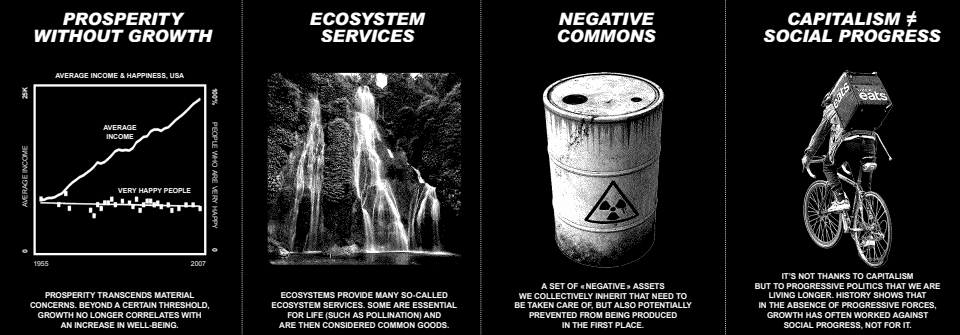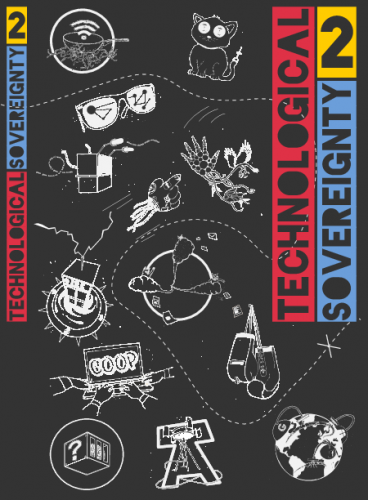A common argument made by proponents of degrowth, supported by historical evidence, is that economic growth is ecologically unsustainable and entails an increasing inequitable distribution of resources. In Tools for degrowth? Ivan Illich’s critique of technology revisited, Silja Samerski discusses Ivan Illich’s (1926-2002) argument that limits to growth are needed not only for ecological or distributive justice, but for social freedom. Any limits must be politically decided, and applied not primarily to the economy, but to technology. [Read more…]
Post Growth Toolkit
Post Growth Toolkit [The Game] is an invitation to reprogram ourselves out of the economic growth orthodoxy. It proposes to literally reshuffle our world-views through a compilation of stories, concepts and tactics in order to stimulate new modes of understanding in the context of current environmental crises. It takes the form of a tactical card game inviting players to explore a number of key notions to facilitate collective debate.
Simplifier: Creating a Stable Foundation of Technology
Mathieu Maury sends us a link to a very interesting (and minimalist) website called Simplifier. From the about-page:
Why do I simplify? How did I get started? What is the goal of this website?
Before developing any other skill, I enjoyed programming. To some extent, I still do; each program is its own universe, built from scratch, and the ability to create these on a whim is fascinating. However, the more time I spent programming, the more I became aware of the fact that software depends on hardware, and hardware is constantly changing. A program is not like a book or a painting; it requires constant upkeep and adaptation to remain in existence.
Initially, this drove me to learn about hardware, so that I could develop a stable platform to build upon; but this too was futile. Components inevitably fail, and there is no guarantee that replacements will be available in the coming years or decades. Essentially, permanent work cannot be achieved on a computer, as the hardware is fundamentally out of the control of the user. No matter what world is created inside of a program, its foundation will always rest on sand.
At this point I left programming entirely, and began searching for other meaningful work to do; but the problem had followed me! No matter what skill I intended to learn, I found that its permanence had been eroded by the chaos of technology. Materials were replaced by brands, techniques replaced by accessories, and craftsmanship replaced by consumerism. Clearly, this was something that needed to be fixed. Clearly, this is what I had to do.
Fundamentally, my work here is about creating a stable foundation of technology that is reliable, understandable, and practical for an individual to build for themselves. As of writing this, I believe I have done this on a conceptual level, but I intend to continue this work to the highest level of technology that I can achieve on my own. I encourage readers to utilize anything here which they find practical for whatever purpose they see fit, and to consider adopting a mindset of simplification in projects of their own.
Tech Talks
Last week, I spoke at The Conference in Malmö, Sweden, where I saw quite some interesting tech talks. The super-efficient Swedes have already uploaded them, so I present you some of my favorites:
- Meghan O’Gieblyn – God in the machine [48:12]
- Brett Scott – The war on cash [14:41]
- Nicole He – Say my name, say my name [15:15]
- Darius Kazemi – Social solutions to social networking [16:20]
Next week, I’m doing a talk in Paris. Knowing the French a bit, these videos will never be uploaded, so be there.
Technological Sovereignty
We deserve to have other technologies, something better than what we nowadays call Information and Communication Technologies. This book delves into the guiding principles of technological sovereignty and proposes new theoretical and practical descriptions of some initiatives developing free technologies. It deals with its psychological, social, political, ecological and economic costs while it relates experiences to create Technological Sovereignty.
The authors bring us closer to other ways of desiring, designing, producing and maintaining technologies. Experiences and initiatives to develop freedom, autonomy and social justice while creating autonomous mobile telephony systems, simultaneous translation networks, leaks platforms, security tools, sovereign algorithms, ethical servers and appropriate technologies among others.
From the introduction to Technological Sovereignty Vol.2,, which is available in English, French, and Spanish. The first volume is available in French and Spanish only.
Anti-Tech Riots
“If the recent speculation about jobs and AI is even close to being correct, then fairly soon “luddite” will join far-right and Islamist on the list of government-defined extremisms”. Read more: Will 2018 be the year of the neo-luddite?








